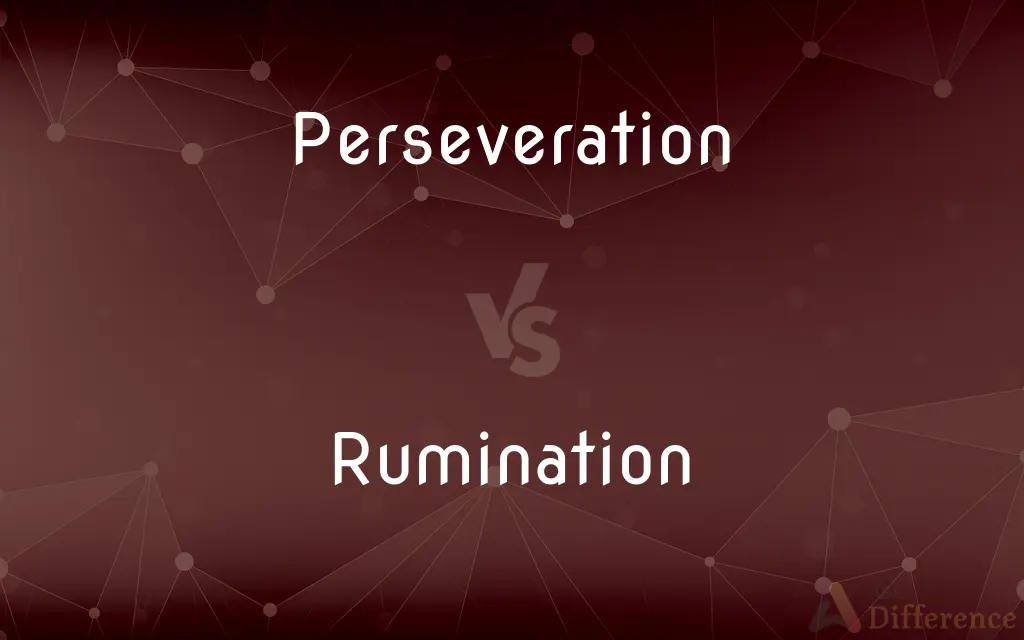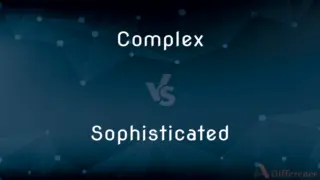Perseveration vs. Rumination — What's the Difference?
By Tayyaba Rehman & Urooj Arif — Updated on March 5, 2024
Perseveration is the repetitive and uncontrollable repetition of a particular response, such as a word, phrase, or gesture, despite the absence of a stimulus, whereas rumination involves continuously thinking about the same thoughts, sad or dark.

Difference Between Perseveration and Rumination
Table of Contents
ADVERTISEMENT
Key Differences
Perseveration is often observed in cognitive, neurological, and psychiatric disorders, manifesting as a compulsive fixation on a specific idea or task without the ability to switch to a different thought or action. It can be due to brain injuries, autism, or conditions like OCD. Rumination, on the other hand, is more psychological, focusing on negative thoughts or events from the past, leading to feelings of sadness, anxiety, or depression. It is commonly associated with mood disorders such as depression.
While perseveration is a cognitive process where the individual gets "stuck" on a particular thought or action regardless of its relevance or context, rumination involves a voluntary but uncontrollable pattern of dwelling on negative thoughts that can exacerbate or contribute to depressive states. Perseveration can affect one's ability to engage in new tasks or change topics in conversation, whereas rumination affects emotional well-being and perspective on life's events.
Perseveration can manifest in various forms, such as motor perseveration, where the individual repeats movements, and verbal perseveration, where the repetition of words or phrases occurs. Conversely, rumination is primarily internal, involving the relentless examination of one's feelings and experiences without necessarily manifesting outwardly.
The impact of perseveration is often on the individual's social interactions and cognitive function, potentially leading to challenges in learning, communication, and completing tasks. Rumination's impact is deeply rooted in emotional distress, leading to a cycle of negative thinking that can hinder an individual's ability to cope with stress and may lead to mental health issues.
Addressing perseveration typically involves cognitive and behavioral interventions aimed at improving flexibility in thinking and actions, often requiring professional assistance from neurologists or psychologists. For rumination, therapeutic strategies might include cognitive-behavioral therapy (CBT) to develop healthier thought patterns and mindfulness practices to break the cycle of negative thinking.
ADVERTISEMENT
Comparison Chart
Definition
Repetitive, uncontrollable repetition of a response.
Continuous, often negative, thought about the same ideas.
Associated Conditions
Cognitive, neurological disorders.
Mood disorders, such as depression.
Impact
Affects cognitive function and social interactions.
Leads to emotional distress and can worsen mental health.
Manifestation
Can be motor or verbal; outward.
Primarily internal; focused on thoughts and feelings.
Treatment
Cognitive and behavioral interventions.
Cognitive-behavioral therapy, mindfulness.
Compare with Definitions
Perseveration
Repeatedly checking the door lock, unable to stop.
His need to check the lock over and over was a clear case of perseveration.
Rumination
Constantly thinking about a missed opportunity.
He ruminated on the job offer he had declined, wondering what if.
Perseveration
Repeatedly mentioning the same topic in conversation.
He kept returning to the same story, a sign of perseveration.
Rumination
Dwelling on a past argument repeatedly.
She couldn't stop ruminating over what was said during the dispute.
Perseveration
Drawing the same object multiple times despite instructions to vary.
Despite the new prompt, she continued drawing houses, showing perseveration.
Rumination
Obsessing over a slight or criticism.
He ruminated on the critique long after the conversation had ended.
Perseveration
Unable to switch tasks at work, sticking to one despite completion.
She struggled with perseveration, focusing on a single task for hours.
Rumination
Focusing on feelings of failure without seeking solutions.
Her rumination on her exam results prevented her from moving forward.
Perseveration
Repeating a word or phrase inappropriately.
His speech was marked by the perseveration of certain phrases.
Rumination
Replaying negative events or outcomes in the mind.
After the breakup, she ruminated on every detail, trying to understand what went wrong.
Perseveration
Perseveration, in the fields of psychology, psychiatry, and speech-language pathology, is the repetition of a particular response (such as a word, phrase, or gesture) regardless of the absence or cessation of a stimulus. It is usually caused by a brain injury or other organic disorder.
Rumination
The act of thinking about something in a sustained fashion.
Perseveration
Repetition of a behavior, idea, or phrase in absence of any functional purpose for the repetition, usually caused by brain injury or other disorder.
Rumination
The act or process of chewing cud.
Perseveration
The tendency to continue or repeat a behavior, sensation, or thought after the cessation of the original stimulus.
Rumination
The regurgitation of food from the stomach after it has been swallowed, - occasionally observed as a morbid phenomenon in man.
Perseveration
The tendency for a memory or idea to persist or recur without any apparent stimulus for it
Rumination
Regurgitation of small amounts of food; seen in some infants after feeding
Perseveration
The act of persisting or persevering; continuing or repeating behavior;
His perseveration continued to the point where it was no longer appropriate
Common Curiosities
Is perseveration always a sign of a neurological condition?
While often associated with neurological conditions, perseveration can also occur in typical individuals under stress or fatigue.
Can perseveration occur in healthy person?
Yes, in the form of habits or under stress, though it's less frequent and less severe than in those with neurological issues.
Does everyone experience rumination?
Many people experience rumination at some point, but it becomes problematic when persistent and distressing.
Are there different types of perseveration?
Yes, including linguistic, cognitive, and motor perseveration, each with specific manifestations.
How does social support affect these conditions?
Strong social support can provide emotional relief and practical strategies to manage or reduce symptoms.
Can rumination be positive?
Rumination is typically negative in psychology; however, reflective pondering on problems with the intent to solve them is seen as more constructive.
Is there a genetic component to either condition?
There may be a genetic predisposition to conditions associated with perseveration and rumination, like OCD and depression.
How is perseveration treated?
Treatment may involve cognitive-behavioral therapy, medications, or interventions targeting the underlying condition.
Can meditation help with perseveration and rumination?
Meditation and mindfulness can help increase awareness and control over these thought patterns.
How can one stop ruminating?
Techniques include mindfulness, cognitive-behavioral strategies, and focusing on problem-solving rather than dwelling on problems.
Can children experience perseveration?
Yes, children, especially those with developmental disorders, can display perseverative behaviors.
Is rumination a disorder?
It's a symptom rather than a disorder itself, often associated with depression and anxiety disorders.
What's the difference between rumination and worry?
Rumination focuses on past events, while worry is about future uncertainties.
Are perseveration and rumination exclusive to specific age groups?
No, both can occur across the lifespan, though their manifestation may vary with age and developmental stage.
Can lifestyle changes affect perseveration or rumination?
Yes, exercise, healthy eating, and sleep can positively impact mental health and reduce symptoms.
Share Your Discovery

Previous Comparison
Tone vs. Attitude
Next Comparison
Complex vs. SophisticatedAuthor Spotlight
Written by
Tayyaba RehmanTayyaba Rehman is a distinguished writer, currently serving as a primary contributor to askdifference.com. As a researcher in semantics and etymology, Tayyaba's passion for the complexity of languages and their distinctions has found a perfect home on the platform. Tayyaba delves into the intricacies of language, distinguishing between commonly confused words and phrases, thereby providing clarity for readers worldwide.
Co-written by
Urooj ArifUrooj is a skilled content writer at Ask Difference, known for her exceptional ability to simplify complex topics into engaging and informative content. With a passion for research and a flair for clear, concise writing, she consistently delivers articles that resonate with our diverse audience.
















































